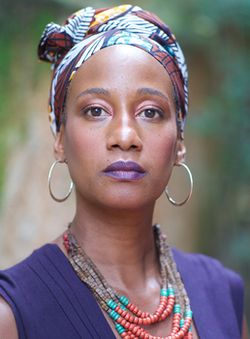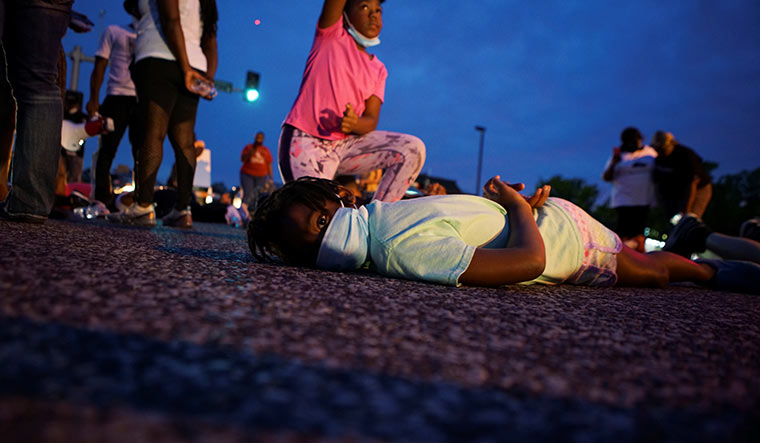There is an avocado tree in my backyard that grows creamy, delicious fruit, but I suspect the roots are rotting. Some branches have hollowed out and when it storms, they crack and fall off. The leaves brown around the edges and sometimes the avocados are speckled and browning inside. Unless we can remove what is attacking its roots, it is just a matter of time before the whole tree dies.
My country’s roots are rotten, too. Some have known this for a while. Some are just discovering this with protests over the on-camera police killing of George Floyd. And some have chosen to ignore the signs and continue eating avocados. Because they are what is causing our roots to rot, and if we do not get rid of the cause of this sickness called racism, the whole tree will die. This is 2020 in the United States of America.
The New World was only new to the Europeans who sailed into it accidently in the late 1400s. In what we now call North and South America, there were already millions of people living in sustainable, thriving societies. These “Indians” were not Christian or “civilised” to European eyes, which claimed the lands for the Catholic church and the resources of the land for the nobles, merchants and royal venture capitalists who funded their travel. This is when the roots began to rot….
After the native inhabitants rebelled, attacked settlers, escaped into the hinterlands or were massacred by guns, swords and Old World diseases like smallpox, the invaders realised they needed another workforce that was inexpensive and virile. They turned to Africa.
The transatlantic slave trade began in 1502 and lasted until the 1860s, bringing 10 to 12 million African women, men and children to the Americas.
Slavery thrived in the southern US. If you had dark skin, you were a slave. No wage was owed for your labour. You could be bought and sold. You had a value, like a goat.
Though most whites in the American south were also poor, their colour provided them status and merit that their financial conditions did not. If poor whites felt their colour made them part of the same “tribe” as the wealthy, then it would be in their interest to defend the race and the ruling class by keeping the black population in check.
In 1861, the United States went to war against itself. In a nation already divided by cultural and political differences, slavery was the catalyst, but not because it was cruel and inhuman. To the rapidly industrialising north, slave labour gave the agricultural south an unfair economic advantage. The promise of emancipation for close to four million slaves could mobilise blacks to side with the north. When the north won the war 1865, (with the help of many free black and escaped slave troops) Abraham Lincoln honoured the promise to free (most of) the slaves.
From 1865 to 1877, the US’s boldest experiment in socialism saw the redistribution of 4,00,000 acres across several southern states, the election of free black men and former slaves to congress and local political positions, and burgeoning black communities with business owners, professionals and the inauguration of black colleges and universities. This was a problem for many southern whites who, in addition to losing the Confederacy, continued to be as poor as or poorer than the former black slaves. Segregation, a system based on skin colour and bloodline, had been in place in the south since slavery, but after the Civil War, it became law. The establishment of the Ku Klux Klan brought an end to the Reconstruction and the best chance for blacks to level the playing field after slavery.
“They don’t see us as human," wrote a friend last week in a WhatsApp group and I had to agree. When the American constitution was written, black slaves were counted as three-fifths of a human (for purposes of taxation and representation for their owners). We did not even become citizens until 1868. And while the law of the land has been updated, not everyone’s consciousness has.
The killing of George Floyd is tragic, but not a surprise for black Americans. What made Floyd’s killing a flash point, in my opinion, is that white Americans finally saw this incident for what it is, perhaps for the very first time. They saw a white police officer kill a human being just because he was black. A collective veil has started to lift and white Americans are realising that their privilege, perhaps taken for granted as a right, makes them complicit by association.
Cities went up in flames around the US and the world has taken to the streets to protest for justice, in defiance of lockdowns, curfews and the very real threat of contamination from the coronavirus. Where I live in Brazil and throughout South America, where those who look more European also benefit from “white privilege”, black and indigenous people are standing in solidarity against police violence, too. Paradoxically, racial discrimination and polarisation at their apex are fuelling a global movement for unity, justice and equality, with more precision and fervour than any politician or religious leader could have whipped up.
“The global community must hold the USA accountable for its human rights abuses, much the same way that the US and her allies are quick to sanction other nations for similar abuses. From police brutality to cruel, inhumane mistreatment of immigrants, especially young children, the US must fear the consequences of such actions otherwise change may never arrive. It's not just Donald Trump, it's the established institutions of cruelty that must be demolished...ASAP,” said Nigerian humanist and activist Fatai Adewusi.
Some white people are turning to black and brown friends and apologising. Some are asking what they can do to help. Honestly, that is a conversation that most black people do not want to have. Racism is not something we created so we cannot fix it. But I will take it upon myself to offer some tips because I want you to figure out how to fix this, white America(s). So…
Let us grieve and do not judge us.
Fortunately, most of the protests of police violence, around the world, have been peaceful. I do not justify violence and looting, but I do understand why it is happening. It is an outlet for the overwhelming anger, fear, hopelessness and frustration we are feeling and have been feeling for centuries. These feelings are ugly and messy under the best of circumstances and even more so when millions are feeling them together. It is like a cyclone. You do not blame it for the heavy rains and winds blowing through. You let it blow through. It will pass. And releasing the anger, which is also being done in positive and constructive ways, is part of the healing process.
Talk to other white people. Honestly, talking to brown and black people is not going to help us or you. We cannot relate to what you are feeling. Our pain is different. You also will not be honest about how you feel if you are talking with us and what we need to change things is some raw honesty, even when it is hard to hear (or say).
Take responsibility. The three police officers who did not have their knee on George Floyd’s neck are also held accountable. They saw what was happening and they did nothing to stop it. If you have benefited from white privilege or the privilege of being part of the ruling elite, you are complicit. Take responsibility for your actions or inaction and then educate yourself so that you can take action towards change.
Stop normalising whiteness. Being white is just one of many human experiences. How you see the world as a white person holds valid and true for you, but probably not for people of colour (most of the world).
Do not speak for people of colour. It is time to listen. We have been ignored and silenced for far too long.
Then, the systems and institutions that uphold and perpetuate racism in the US and around the world must be dismantled. According to a 2019 Oxfam report, 26 billionaires hold 60 per cent of the world’s wealth. The great majority of this minuscule group are white men. Not only is this grossly unjust, it is unsustainable.
So, yes, black and brown people in the US and around the world are raging, are grieving and rightfully so. And when this cyclone has passed, we need to work together to rebuild our societies and institutions on foundations of equality where power is redefined and not used as a weapon to oppress and control. Housing, food and health care can no longer be commodities for profit and provided only to those who can pay for them. They must become basic human rights. We must redefine success by how we take care of each other and our environment, how we provide for our children and make sure we give them a better world than we were given, and by how happy and fulfilled each individual feels inside.
This time, we must build a foundation from love, otherwise we are going to end up with a version of what we have now with just a change in the colour of the oppressors. I am not talking rainbows and lollipops, love. I am talking about the kind of love that Dr Martin Luther King, Mother Teresa, Nelson Mandela, Malala Yousafzai and Mahatma Gandhi spoke about, to peacefully bring deep societal transformation and longstanding change. The rest, we are going to have to figure out on our own because, well... we are making a new world from the ashes of the old.
The writer is an African American singer settled in Brazil.




